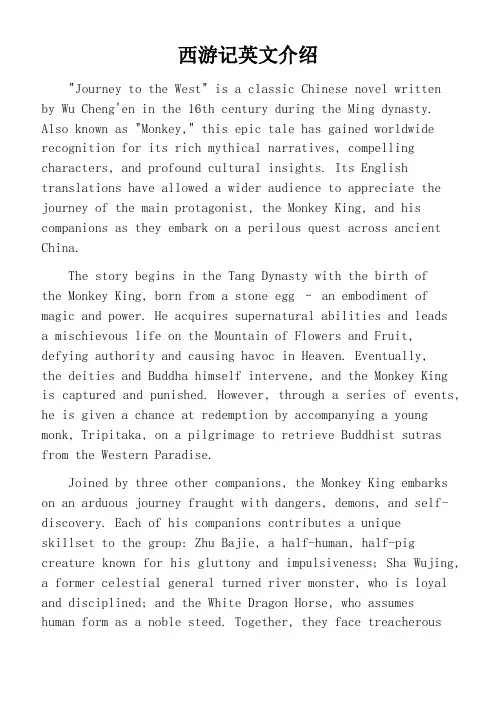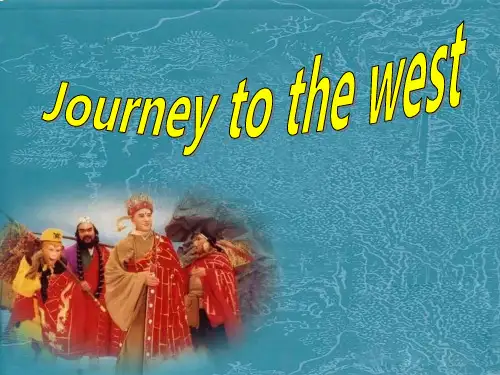四大名著——《西游记》英文介绍PPT (模板+插图)
- 格式:ppt
- 大小:5.35 MB
- 文档页数:16


西游记英文介绍"Journey to the West" is a classic Chinese novel writtenby Wu Cheng'en in the 16th century during the Ming dynasty. Also known as "Monkey," this epic tale has gained worldwide recognition for its rich mythical narratives, compelling characters, and profound cultural insights. Its English translations have allowed a wider audience to appreciate the journey of the main protagonist, the Monkey King, and his companions as they embark on a perilous quest across ancient China.The story begins in the Tang Dynasty with the birth ofthe Monkey King, born from a stone egg – an embodiment of magic and power. He acquires supernatural abilities and leads a mischievous life on the Mountain of Flowers and Fruit, defying authority and causing havoc in Heaven. Eventually,the deities and Buddha himself intervene, and the Monkey King is captured and punished. However, through a series of events, he is given a chance at redemption by accompanying a young monk, Tripitaka, on a pilgrimage to retrieve Buddhist sutras from the Western Paradise.Joined by three other companions, the Monkey King embarks on an arduous journey fraught with dangers, demons, and self-discovery. Each of his companions contributes a uniqueskillset to the group: Zhu Bajie, a half-human, half-pig creature known for his gluttony and impulsiveness; Sha Wujing, a former celestial general turned river monster, who is loyal and disciplined; and the White Dragon Horse, who assumes human form as a noble steed. Together, they face treacherousrivers, eerie mountains, and sinister forces, all while encountering numerous gods, spirits, and monsters.Throughout their journey, the Monkey King and his companions undergo numerous trials and tribulations, testing their resolve and strengthening their bonds. They face formidable opponents, including the Bull Demon King, Princess Iron Fan, and Red Boy, all eager to obstruct their mission and feast on the monk's flesh to attain immortality. However, with the Monkey King's extraordinary powers, quick wit, and indomitable spirit, they overcome these obstacles and continue onward."Buddha's Quest with the Monk Tang" is not merely an adventure story but also a reflection of the human condition and a profound exploration of Buddhist philosophy and morality. Through vivid storytelling and allegorical motifs, it addresses universal themes such as the struggle between good and evil, the quest for enlightenment, and the consequences of greed and desire. The main characters undergo personal transformation and learn valuable lessons about humility, loyalty, and the interconnectedness of all beings.The Monkey King, in particular, represents the potential for enlightenment and the triumph over adversity. From an impulsive troublemaker, he matures into a compassionate and wise protagonist who eventually attains Buddhahood. His journey mirrors the spiritual journey of ordinary humans, emphasizing the importance of self-reflection, discipline, and inner strength.In addition to its literary significance, "Journey to the West" has had a significant impact on Chinese culture. Itsthemes and characters have inspired countless artworks, theatrical adaptations, and modern reinterpretations. The Monkey King, in particular, has become an icon in Chinese popular culture, embodying characteristics of bravery, loyalty, and trickery. The novel's enduring popularity has also made it a symbol of Chinese identity and heritage.In conclusion, "Journey to the West" is a timeless masterpiece that transcends cultural boundaries. It offers readers an enchanting and epic adventure, while delving deeper into profound existential questions. Its universal themes and enchanting characters continue to captivate audiences, allowing them to embark on their own inner journey alongside the Monkey King and his companions.。



